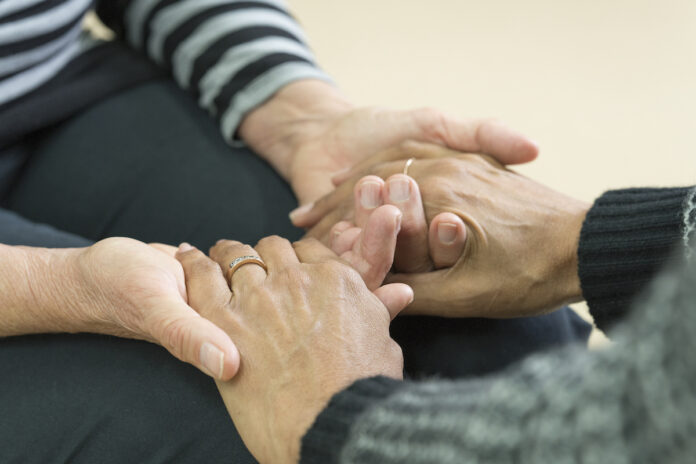As a profession, medicine is beginning to be aware that we must care for the whole person, if we are to truly practise the art and science of our craft. Gone are the days when we could just stand by the bedside, pronounce the diagnosis and treatment from on high, and move on to the next person, with hardly a word being spoken by, or to, the patient. Our patients are becoming more aware, more informed, and more self-empowered when it comes to asking us for clear information about their condition. They are trying to communicate with us, and we are being asked to communicate with them. How do we respond to all this? Buzz words abound when it comes to communication – compassion, empathy, sympathy – but what do they all mean?
Some dictionary definitions
Sympathy is defined as:
- feelings of pity and sorrow for someone else’s misfortune
“they had great sympathy for the flood victims”
It comes to us via Latin from the Greek sumpatheia, from sumpathēs, from sun ‘with’ + pathos ‘feeling’.
Empathy is said to be:
- the ability to understand and share the feelings of another.
It comes from the Greek empatheia, from em ‘in’ + pathos ‘feeling’.
Compassion is:
- sympathetic pity and concern for the sufferings or misfortunes of others.
“the victims should be treated with compassion”
And comes from the Latin compati, compassio, from com ‘with’ + ‘passio ‘suffer’, meaning to suffer with.
No wonder we feel confused! There is a lot of overlap between these definitions, which have seemingly come from similar roots, and we often conflate and confuse the meanings.
Empathy is portrayed as being something more noble and desirable than sympathy, but in reality, it is just a sophisticated form of the same. Empathy is designed to offer a reflection that you have been heard and understood, but it is practised in a way where the practitioner takes on the feeling into their own body, which we are not designed to do, or imagines how it would feel, which takes them out of their body and into their head.
Interestingly, the word compassion has been reinterpreted to mean ‘with suffering’, whereas its true meaning is ‘with feeling’ and true feeling is not emotional, but is, in essence, love and care.
More than meets the eye
All these words are all very well, but how do we put these understandings into practice, for there is more to understanding this than meets the eye.
Energy is coming at us all the time, through people, and in life. We actually first feel it in our bodies, and then make sense of it in our heads.
If we observe what is there, just the facts, without judgement or reaction, we can see clearly what is going on and we know what to do next. We don’t take it on in our bodies, we just see it for what it is. Observing gives us the space to feel what is there to be felt, and do what is there to be done, to truly respond to people and situations. This makes us very effective, as doctors and as people in life.
This is true compassion; just feeling and observing what is there, without judgement or reaction, which allows us to understand it in full and accept it for what it is.
If, when we feel the energy we react to it, we allow the emotion in; we are ‘taken in’ by the energy of the situation. We are no longer observing it from the outside; we are inside of it. This affects how we see the situation and we are no longer able to read it clearly and know what to do.
We then have to go into our heads to try and figure it out, which is a much more slow and laborious process than just knowing, and comes with attendant anxiousness, fear and self-doubt, because we know that we are not truly reading and responding.
When we take on the emotion, we can become emotional ourselves, and we feel sorry for ourselves and for other people. This is actually what sympathy is. Not quite so noble, when you see it this way, and definitely not healthy for us. We are not designed to deal with other people’s emotions, as they are not our issues to debase and heal, and they can literally make us sick.
Working as we do, with ill and often highly emotional people, these two ways of dealing with and communicating with people are worlds apart.
One – reaction and sympathy – can lead to illness, exhaustion, burnout, depression, anxiety and all the behaviours that come with them to try and cope with how we are feeling.
The other – observation, understanding and true compassion – allows us to be with people, no matter what they are going through, without taking it on ourselves, and allows us to feel and know how best to care for them and offers the healing space for them to arise out of where they currently are. This brings us purpose, joy, and a working life that nourishes and inspires us.
Can we develop compassion rather than struggling with sympathy?
Understanding that we are here to help people, but that we cannot do it for them, has been hugely helpful for me in my evolution as a doctor and as a person. It is not my job to save people from themselves… it is my job to do my job and to reflect to people a true and loving way to be and work and live.
If I allow myself to observe where people are at, and to understand that they are making choices to be there, I can just be aware of what is actually going on and why, with no judgment around it, and then my responsibility in the situation is clear, which allows me to respond to the situation and to speak with absolute honesty, in a loving way, about what I feel is their responsibility too.
If I absorb what is going on into my body, I go into sympathy or empathy, and when I feel this, then I know I am in reaction, which means I am no longer reading the situation for what it is, but have cast my own ideals of how I would like it to be over them, as a veil that prevents me from seeing them clearly. And I have come to understand that when I feel sympathy for another, I am actually feeling sorry for myself, and not wanting to feel the pain that they are in, or the undealt-with hurt that the situation has triggered in me.
In this way, feelings of sympathy can be a signpost for me now, that I have something yet-to-be-healed in me that is being triggered, and it is an offering to go deeper in my understanding of myself, to feel the hurt, deal with the energy that I have taken on, and deepen my love for myself and other people, which reignites my purpose and renews my commitment to my work and my life. This fuels me with the energy needed to complete what needs to be done, so that at the end of the day I am left feeling complete, and ready to rest, in preparation for another day…
Sympathy and empathy are a ‘normal’ part of human life, but we are so much more than human, for we are energetic beings as well as physical flesh and blood, and there are much more healthy ways of dealing with our experiences and feelings than feeling sorry for ourselves and other people.
True compassion allows us to truly observe and deeply understand where people are at and to accept the choices that have led them there and offers the healing space for them to arise out of it, if they so choose… it is not only the way to a joyful working career… it will lead to a joyful life.










It’s wonderful the way you have explained the differences between these ways of living and working with people, Anne. Yes, empathy has become a bit of a buzz word yet it still leads to burnout and reaction. True compassion offers a way beyond the pitfalls of feeling sorry for and absorbing all the ills of others. Thank you for the detailed descriptions of each word and offering readers a way forward.
Thank you Helen, I appreciate your appreciation! I enjoyed exploring the meaning of these words in greater detail and how to truly apply them in our lives.
Another wonderful article Anne. It is really important for us in healthcare to go beyond mere words and feel the quality and effect of each of these. I have noticed in health in the last decade or so that sympathy has become the ‘bad word’ and now see empathy and compassion as the ‘good words’ and one and the same. Although we have moved away from using the word sympathy, I have seen that the energy of sympathy is still thick in healthcare. I am sure a lot of the tension, overwhelm and stress that health professionals experience is due to feeling sorry for the patient and responsible for their health. This is not our place to take their responsibility and stops the patient from stepping up to the mark to take ownership of their own health and wellbeing. As you have shared, observation is key to clearly see what is before you and treat the whole person.
I am currently experiencing what it feels like to have absorbed rather than observed. It is painful indeed. My choice to absorb whilst working in the Child Protection system has not been helpful for the children and families I serve, or for myself. This article highlights the real need for any of us to step back observe and then step forward in compassion for it is the only way to truly help and care for another. Thank you Anne – I’d like to have read this article when I was 7 years old, ’cause I feel that this is when I first lost the knowing to observe and read, and fell into the need to help and make better. True compassion and providing space – the only way to work ♥️
Thanks Anne. A very important topic for anyone working in healthcare and one that we need to gain a deeper understanding of. Given what you have said here Anne about sympathy and empathy and looking at the health of doctors, nurses and other health care professionals we may need to start asking if we are becoming unwell from more from ‘taking on’ all of the emotions around us. Learning to observe would seem like one of the greatest ways we can care for ourselves as well as those in our care.